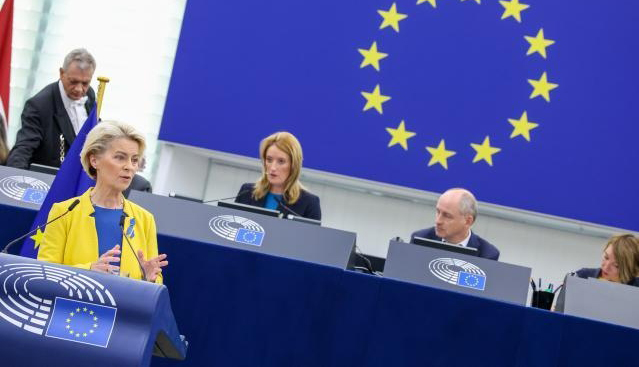IMDEA Nanociencia: at the forefront of European research on rare earths and strategic raw materials for the Green Transition
21.09.2022
 |
|
President Ursula von der Leyen during her speech on the State of the Union on 14th September. Photo: European Commision. |
- Seven international R&D projects, with public and private funding, position the Madrid-based centre at the forefront of research in the development of sustainable solutions for Europe.
- Three key pillars encompass the centre's activities in the area of strategic raw materials: innovation in materials, recycling and the search for "Made in Europe" alternatives.
- Joint work with international research centres and around 20 companies in the energy, transport and communications sectors ensures successful implementation.
- The applications of ongoing projects in the areas of raw materials and electric mobility will contribute to achieving the objectives of the Ecological Transition Plan.
Madrid, 21st September, 2022. The Madrid Institute for Advanced Studies in Nanoscience (IMDEA Nanociencia), through its Critical Materials and Sustainability Programme, is leading high-impact initiatives in the field of strategic raw materials for Europe's present and future technological development.
President Ursula von der Leyen's message to the European Commission on 14th September made clear the fragile situation facing the European Union in its technological development towards a greener future: "Today Russian gas, tomorrow Chinese rare earths: the EU wants to reduce its dependence on strategic raw materials".
Europe is dependent on raw materials that are indispensable for a green transition towards achieving the goals of the European Green Deal. However, the supply of critical materials, such as rare earths, depends on the monopoly of countries such as China, to the extent that more than 90% of the extraction and processing of these elements takes place in China.
Rare earth-based magnets drive our world and this statement is literal, so much so that if they were to suddenly disappear, our technological development would cease immediately. An electric car requires more than 1 kg of rare earths to manufacture the magnets that drive the motor and as many others (more than 200 magnets) that drive each of the mechanisms (electric windows, gear shift sensor, safety systems, etc.).
In another order of magnitude, a wind turbine motor requires up to 2 tonnes of rare earths to manufacture the permanent magnets that make it work. Yet Europe is dramatically dependent on 98% of rare earth imports from China, and recycles less than 1% of the magnets containing these valuable elements after the end of their useful life. Vehicle motors (cars, buses, trucks, motorbikes...), wind turbines, lift motors, electronic devices (mobiles, hoovers, televisions, loudspeakers, etc.), the list is endless and they all require magnets that are made from raw materials that we are not producing in Europe.
The IMDEA Nanociencia Permanent Magnets Group, led by researcher Alberto Bollero, is working on various international projects funded by the European Union, covering three fundamental pillars to guarantee sustainable technological development in Europe:
- Innovation in materials that include critical elements (rare earths) to improve their efficiency and reduce their content.
- Recycling of rare earth magnets at the end of life of electronic devices and motors, in the framework of the digital transformation, enabling the transition from a linear to a circular economy.
- Sustainable diversification through the search for alternative materials based on abundant raw materials available in Europe, in order to break the current dependence on aggressive monopolies.
In this area, IMDEA Nanociencia coordinates pioneering international initiatives such as the European project PASSENGER involving 20 centres, including 13 companies, to achieve the creation of 8 pilot plants by 2025 to make the production of new "Made in Europe" materials and their implementation in electric vehicles a reality. These initiatives stem from the one of the new research lines "Nanotechnology for Critical Raw Materials and Sustainability" of the 4-year ‘Severo Ochoa Excellence’ project, awarded to IMDEA Nanociencia in 2017 and recently renewed for another 4 years.
More information: https://state-of-the-union.ec.europa.eu/index_en
Contact
Prof. Alberto Bollero
alberto.bollero [at]imdea.org
Grupo de Imanes Permanentes y Aplicaciones
Twitter: @permagimdea
IMDEA Nanociencia Dissemination and Communication Office
divulgacion.nanociencia [at]imdea.org
Twitter: @imdea_nano
Facebook: @imdeananociencia
Instagram: @imdeananociencia
Source: IMDEA Nanociencia




